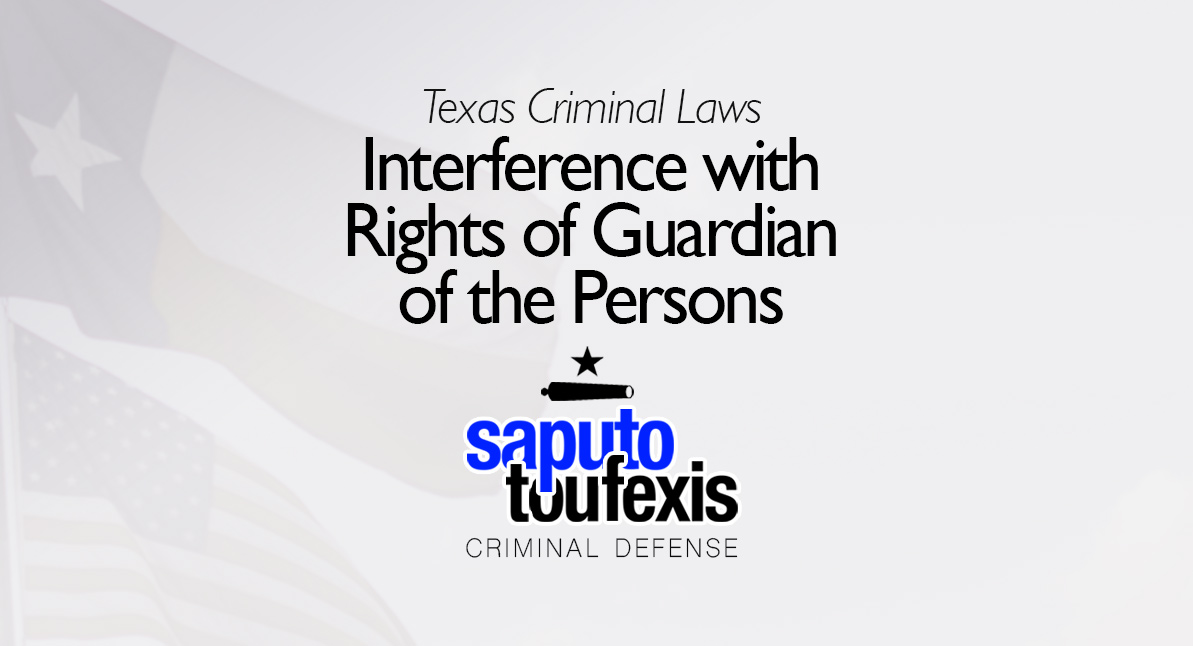The Texas Interference with Rights of Guardian of the Persons law gives police the right to arrest you if they believe you took a person who had a guardian knowing that it interferes with the possessory right of the ward.
FAQs about the
Interference with Rights of Guardian of the Persons law in Texas
- What is the current Texas law about Interference with Rights of Guardian of the Persons?
- What is the penalty for a Texas Interference with Rights of Guardian of the Persons offense?
- How can I be charged with an Interference with Rights of Guardian of the Persons offense in Texas?
- What is the statute of limitations for Interference with Rights of Guardian of the Persons in Texas?
- Can you get probation for Interference with Rights of Guardian of the Persons in Texas?
- What level of crime is Interference with Rights of Guardian of the Persons in Texas?
The Texas legislature codified this criminal offense in Texas Penal Code Section 25.10. TThe legislature did not update this law in 2025. In fact, this law has not been amended since 2017, when the legislature made som nonsubstantive changes that updated some of the references in this statute to the proper ones in the Estates Code.
The Penal Code classifies the Texas Interference with Rights of Guardian of the Persons law under Title 6 “Offenses Against The Family,” Chapter 25 “Offenses Against The Family.” This chapter includes crimes that focus on familial, parent, and spousal relationships. Some of the offenses relate to sexual or violent behavior, while others deal with custody and possession of children. Learn more about the Texas offense of Interference with Rights of Guardian of the Persons below.
What is the current Texas law about Interference with Rights of Guardian of the Persons?
AV Preeminent Texas lawyer Paul Saputo provides the current law defining Interference with Rights of Guardian of the Persons in Penal Code Section §25.10, as follows:[1]
(b) A person commits an offense if the person takes, retains, or conceals a ward when the person knows that the person’s taking, retention, or concealment interferes with a possessory right with respect to the ward.
A ward is a person who has a guardian.[2]
What is the penalty for a Texas Interference with Rights of Guardian of the Persons offense?
A conviction for Interference with Rights of Guardian of the Person in Texas is punished as a state jail felony,[3] with a maximum possible fine under Texas state law of up to $10,000 and state jail time of up to 2 years.
How can I be charged with an Interference with Rights of Guardian of the Persons offense in Texas?
You can be charged with Interference with Rights of Guardian of the Person in Texas if the state’s attorneys believe that each of the elements of §25.10(b) as described in the section above have been met.
What is the statute of limitations for Interference with Rights of Guardian of the Persons in Texas?
Interference with Rights of Guardian of the Persons offenses have a three-year limitations period.[4]
Can you get probation for Interference with Rights of Guardian of the Persons in Texas?
The Texas Code of Criminal Procedure allows both judges and juries to grant probation for Interference with Rights of Guardian of the Persons, and judges are also allowed to accept deferred adjudication plea deals.[5]
Note, however, that judges may not grant community supervision after a conviction if (1) the defendant used or exhibited a deadly weapon during the commission of the felony or immediate flight thereafter and (2) the defendant used or exhibited the deadly weapon himself or was a party to the offense and knew that a deadly weapon would be used or exhibited.[6]
What level of crime is Interference with Rights of Guardian of the Persons in Texas?
The Penal Code classifies the punishment for Interference with Rights of Guardian of the Persons as a state jail felony.
Learn more about the penalty range for this offense in the section above.
Legal References:
^1. Texas Penal Code §25.10. This law is current as of 2025.^2. Texas Penal Code §25.10(a)(2) – “Ward” has the meaning assigned by Section 601, Texas Probate Code.”^3. Texas Penal Code §25.10(c)^4. See Code of Criminal Procedure §12.01(11)^5. See Chapter 42A, Texas Code of Criminal Procedure, Art. 42A.054, Art. 42A.056, Art. 42A.102^6. Art. 42A.054(b), Texas Code of Criminal Procedure










